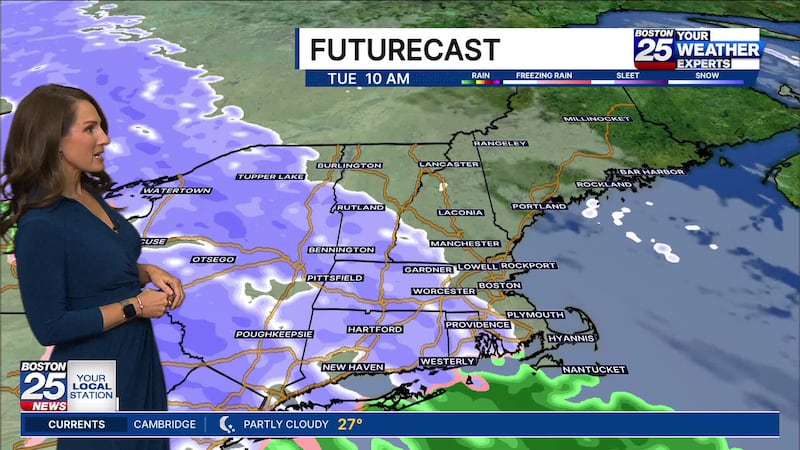BOSTON — Family and friends of a Fairhaven woman said she died after being stricken by Eastern Equine Encephalitis (EEE). The Massachusetts Department of Public Health confirmed a fourth person in the state has been diagnosed with EEE, but would not comment on the woman's death. DPH said three other people and four animals in the state also have been infected with the virus.
Mosquito samples collected across the state have tested positive for EEE and West Nile Virus (WNV).
DPH said 28 cities and towns in Massachusetts are at critical risk from EEE: Acushnet, Brookfield, Carver, Colrain, Easton, Freetown, Grafton, Granby, Heath, Holliston, Hopkinton, Lakeville, Marion, Medfield, Mendon, Methuen, Middleborough, New Bedford, Northbridge, Norton, Raynham, Rochester, Shrewsbury, Southborough, Upton, Uxbridge, Wareham and Westborough.
24 cities and towns are at high risk from EEE, including: Andover, Attleboro, Berkley, Bridgewater, Dighton, East Bridgewater, Fairhaven, Framingham, Halifax, Lawrence, Marlborough, Mattapoisett, Millbury, Northborough, Plympton, Rehoboth, Sutton, Taunton, West Bridgewater and Whitman.
55 cities and towns are at moderate risk from EEE, including: Abington, Ashland, Attleboro, Berlin, Bolton, Boylston, Brockton, Canton, Dartmouth, Duxbury, Fall River, Falmouth, Foxborough, Hanover, Hanson, Harvard, Holliston, Hopedale, Kingston, Mansfield, Marshfield, Milford, North Attleboro, Norwell, Pembroke, Plymouth, Rockland, Seekonk, Sharon, Shirley, Somerset, Swansea, Uxbridge, Walpole, West Boylston and Westport.
EEE has been found in 334 mosquito samples this year and many of them are from species of mosquitoes capable of spreading the virus to people. WNV has been found in 54 mosquito samples.
A man in the age range of 61-70 from Plymouth County, a man in the age range of 21-30 from eastern Worcester County and a man in the age range of 71-80 from northern Franklin County have become the state's first persons infected with EEE since 2013.
On August 25, DPH reported a woman in the age range of 51-60 from southern Bristol County had become the state's fourth person infected with EEE this year. The same day, family and friends of a Fairhaven woman said she died of EEE. Fairhaven is located in Bristol County. DPH wouldn't comment on the woman's death.
>>RELATED: Family says Fairhaven woman died from EEE; 4th human case diagnosed in Bristol Co.
A young goat from Bristol County, a horse from Mendon, a horse from Uxbridge and a horse from Methuen have also tested positive for EEE.
DPH is working with local boards of health, local Mosquito Control Projects and other mosquito control experts to coordinate surveillance and discuss appropriate public health response activities.
"Although cooler weather will start to reduce mosquito populations, the season is not over yet," said DPH Commissioner Monica Bharel. "We are urging people across the state to remember that the peak time for transmission of mosquito-borne illness extends through September here in Massachusetts."
DPH and the Massachusetts Department of Agricultural Resources (MDAR) conducted an initial round of aerial spraying during the overnight hours of August 8-11 in specific areas of southeastern Massachusetts. A second round of spraying concluded the weekend of August 24-25. The double spraying is expected to achieve maximal effectiveness.
DPH and MDAR will also conduct aerial spraying in specific areas of Worcester and Middlesex counties starting on August 26 and continuing for several evenings. The communities either partially or fully in the spray zone are Ashland, Berlin, Blackstone, Douglas, Dudley, Framingham, Grafton, Holliston, Hopedale, Hopkinton, Marlborough, Mendon, Milford, Millbury, Millville, Northbridge, Northborough, Oxford, Shrewsbury, Southborough, Sudbury, Sutton, Upton, Uxbridge, Webster, Westborough and Worcester.
The ability to spray is weather dependent and the schedule may change.
"Due to the continued high risk levels in southeastern Massachusetts, the Commonwealth is taking action to protect public health by conducting a second aerial spray to further reduce the population of mosquitoes that transmit the EEE virus," said MDAR Commissioner John Lebeaux. "As aerial sprays cannot completely eliminate the risk of EEE transmission, we ask the public to follow the personal protection practices suggested by DPH."
EEE is a rare, but serious and potentially deadly disease, that can affect people of all ages. EEE occurs sporadically in Massachusetts with the most recent outbreaks occurring from 2004-2006 and 2010-2012. There were 22 human cases of EEE infection during those two outbreak periods. The last human case of EEE in Massachusetts occurred in 2013.
All residents are reminded they should use an EPA-approved bug spray, wear long sleeves and pants to cover exposed skin and cancel outdoor activities between dusk and dawn when mosquito activity is at its highest.
From the Massachusetts Department of Public Health:
Apply Insect Repellent when Outdoors. Use a repellent with an EPA-registered ingredient (DEET (N, N-diethyl-m-toluamide), permethrin, picaridin (KBR 3023), oil of lemon eucalyptus [p-methane 3, 8-diol (PMD)] or IR3535) according to the instructions on the product label. DEET products should not be used on infants under two months of age and should be used in concentrations of 30% or less on older children. Oil of lemon eucalyptus should not be used on children under three years of age.
Be Aware of Peak Mosquito Hours. The hours from dusk to dawn are peak biting times for many mosquitoes. Consider rescheduling outdoor activities that occur during evening or early morning in areas of high risk.
Clothing Can Help Reduce Mosquito Bites. Wearing long-sleeves, long pants and socks when outdoors will help keep mosquitoes away from your skin.
Drain Standing Water. Mosquitoes lay their eggs in standing water. Limit the number of places around your home for mosquitoes to breed by either draining or discarding items that hold water. Check rain gutters and drains. Empty any unused flowerpots and wading pools, and change the water in birdbaths frequently.
Install or Repair Screens. Keep mosquitoes outside by having tightly-fitting screens on all of your windows and doors.
Animal owners should reduce potential mosquito breeding sites on their property by eliminating standing water from containers such as buckets, tires, and wading pools – especially after heavy rains. Water troughs provide excellent mosquito breeding habitats and should be flushed out at least once a week during the summer months to reduce mosquitoes near paddock areas. Horse owners should keep horses in indoor stalls at night to reduce their risk of exposure to mosquitoes. Owners should also speak with their veterinarian about mosquito repellents approved for use in animals and vaccinations to prevent WNV and EEE. If an animal is suspected of having WNV or EEE, owners are required to report to DAR, Division of Animal Health by calling 617-626-1795 and to the Department of Public Health (DPH) by calling 617-983-6800.
More Resources from the Massachusetts Department of Public Health:
Current WNV & EEE Activity (June – October)
Fact Sheet: EEE (Eastern Equine Encephalitis)
Fact Sheet: WNV (West Nile Virus)
Preventing mosquito bites brochure
Frequently asked questions about mosquitoes in Massachusetts
Gardening tips – Don't let the bugs bite!
Cox Media Group






